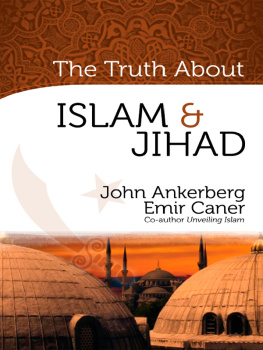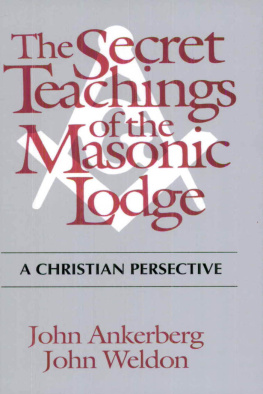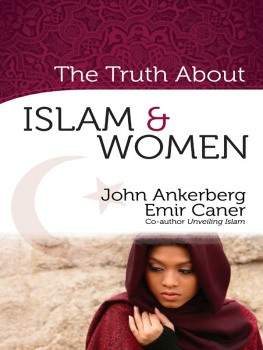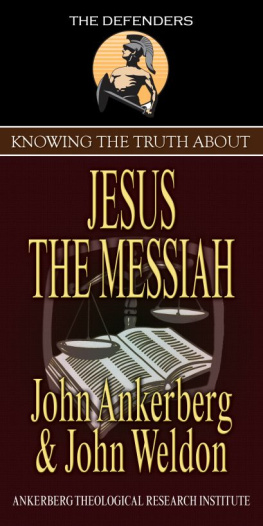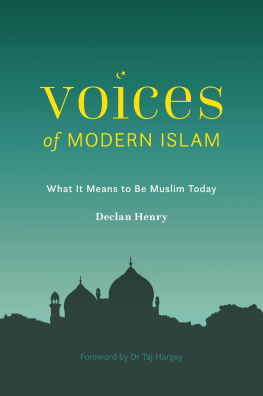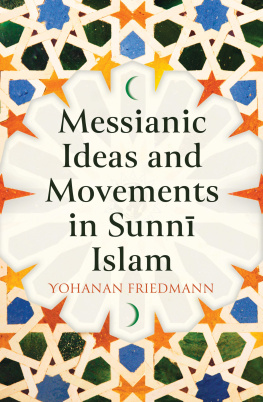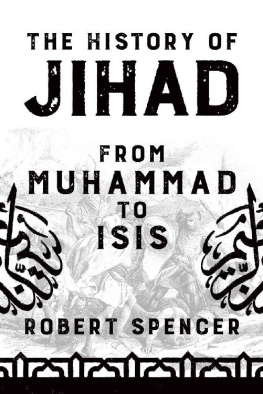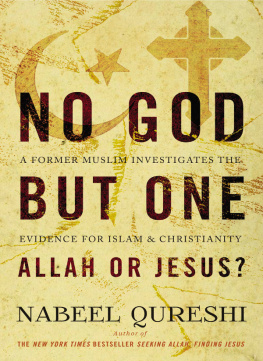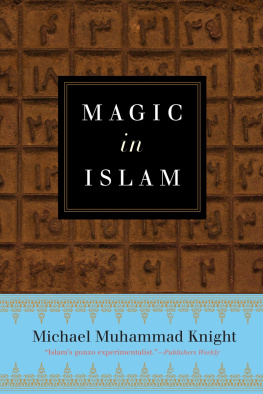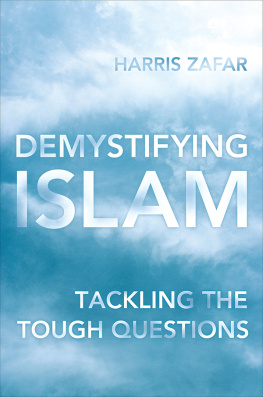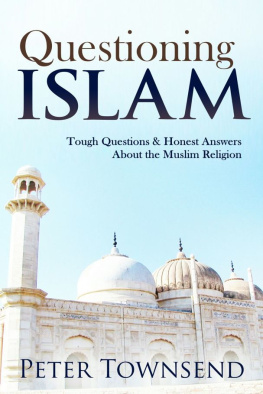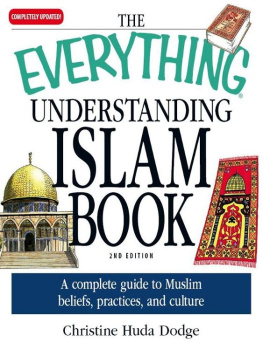

HARVEST HOUSE PUBLISHERS
EUGENE, OREGON
Unless otherwise indicated, all Scripture quotations are taken from the HOLY BIBLE, NEW INTERNATIONAL VERSION. NIV. Copyright1973, 1978, 1984 by the International Bible Society. Used by permission of Zondervan. All rights reserved.
Verses marked NASB are taken from the New American Standard Bible, 1960, 1962, 1963, 1968, 1971, 1972, 1973, 1975, 1977, 1995 by The Lockman Foundation. Used by permission. (www.Lockman.org)
All emphasis (italics) in Scripture quotations has been added by the authors.
Cover by Dugan Design Group, Bloomington, Minnesota
Cover photos Roberto A. Sanchez / iStockphoto; StockXpert
THE TRUTH ABOUT ISLAM AND JIHAD
The Truth About Islam Series
Copyright 2009 by John Ankerberg and Emir Caner
Published by Harvest House Publishers
Eugene, Oregon 97402
www.harvesthousepublishers.com
Library of Congress Cataloging-in-Publication Data
Ankerberg, John, 1945-
The truth about Islam and jihad / John Ankerberg and Emir Caner.
p. cm.
Includes bibliographical references.
ISBN 978-0-7369-2501-3 (pbk.)
1. Jihad. I. Caner, Emir Fethi. II. Title.
BP182.A54 2009
297.7'2dc22
2008046373
All rights reserved. No part of this publication may be reproduced, stored in a retrieval system, or transmitted in any form or by any meanselectronic, mechanical, digital, photocopy, recording, or any otherexcept for brief quotations in printed reviews, without the prior permission of the publisher.
Contents
Though many of the Arabic words used in this book are described in their context, a few foundational terms are noted here to help explain what you may encounter in these pages. The version of the Quran used in this book, unless otherwise indicated, is the translation of Mohammed Pickthall, considered one of the most authoritative versions among English-speaking Muslims.
Bukhari : Named after its compiler, Muhammad ibn Ismail al-Bukhari, this Hadith (collection of reports about Muhammad) is the most respected compilation within the Sunna , the body of practice and custom based on Muhammads words and deeds.
Caliph (also calif ): The title of Islamic leaders after Muhammads death. Among the Shiites, caliphs have been replaced by imams.
Five Pillars : The five foundational spiritual practices in Islam required of all Muslims in order to enter Paradise.
Hadith : Story or report: collection of sayings and examples of Muhammad; highest Islamic authority after the Quran.
Hajj : One of the five pillars of Islam. It commands all Muslims able to do so to visit the Muslim holy site in Mecca at least once during their lifetime.
Hijra (English, hegira ): Literally, departure: the flight of Muhammad and his followers from Mecca to Medina in AD 622.
Imam : A Muslim holy leader, usually in charge of a local mosque. In Shiite Islam, a supreme spiritual guide who is a direct descendant of Ali, and thus Muhammad.
Jihad : An Arabic term for resistance, interpreted as a spiritual struggle or as an external struggle (violence and war).
Kafir (plural, kuffar ): An infidel; a disbeliever in Allah.
Mecca : Islams most holy site, which all able Muslims must visit at least once during their lifetime.
Mosque : A building in which Muslims hold prayers and worship activities.
Mujahid (plural, mujahidin ): A holy warrior; one who fights for Islam.
Muslim : One of the most respected ( sahih ) compilations of the words and deeds of Muhammad (the Sunna ), this collection, named for its compiler, Muslim ibn al-Hajjaj, contains about 4,000 traditions ( ahadith ).
Quran : The holy book of Muslims, said to contain, word for word, the instruction Allah gave to Muhammad, the founder of Islam.
Shia : Literally, faction. Shiite has come to mean a follower of Alione who believes the caliph Ali was the true successor to Muhammad.
Sunni : People of the Way. Followers of Abu Bakr and Umar, the first two caliphs, as successors to Muhammad.
Sura (sometimes surah ): The name used for each section of the Quran; equivalent to chapters in reference to the Bible.
Umma : The Islamic community; the community of believers in Allah.
Mohammed Marmaduke Pickthall, tr., The Meaning of the Glorious Quran.
And fight them until persecution is no more, and religion is for Allah .
S URA 2:193
Jihad , viewed as synonymous with holy war, is a word that has brought fear and concern to millions in the West during recent years. Seen through the lenses of the 9/11 attacks of 2001, the Madrid train bombings of 2004, and the London bombings of 2005 (also known as the 7/7 bombings), jihad has become indistinguishable from militant Islams insatiable and merciless war against Western democracies. These societies, due to their staunch belief in political freedom, are in fact regarded by Islamists as putrid enablers of immorality who wish to export their sins to Muslims throughout the world.
However, the aggressive war waged against the West is only one front on which the Islamists fight. These purist Muslims are also waging battle against an internal foe known as infidels (Arabic, kuffar ). Infidels are defined simply as those who were born Muslim and convert to some other faith.
More than any others, it is these men and women who are most likely to find themselves at the wrong end of a Muslim sword or rifle. Is it not ironic that these peoplethe ones closest to and embedded in Muslim cultureare themselves the most prone to have their blood shed by those who believe it is their duty to rid their societies of corruption and wickedness?
Those who persecute infidels take action based on the words of their founding prophet, Muhammad, who declared, If a Muslim changes his Islamic religion, kill him (Bukhari 9.57). Thus, when asking whether Islam is a religion of peace or violence, one approach is to view that question through the eyes of a person who was part of that system and then rejected it.
Consider the Muslim convert from Judaism who was executed by the order of Muhammad for reverting to his previous faith. The account is found within the second sacred text of Islam, known as the Hadith (traditions):
Behold: There was a fettered man beside Abu Muisa. Muadh asked, Who is this (man)? Abu Muisa said, He was a Jew and became a Muslim and then reverted back to Judaism. Then Abu Muisa requested Muadh to sit down but Muadh said, I will not sit down till he has been killed. This is the judgment of Allah and His Apostle[] (for such cases) and repeated it thrice. Then Abu Musa ordered that the man be killed, and he was killed. Abu Musa added, Then we discussed the night prayers and one of us said, I pray and sleep, and I hope that Allah will reward me for my sleep as well as for my prayers.
This story is remarkable for numerous reasons, not the least of which is the effortlessness with which Muhammads confidants take someones life. Additionally, the two Muslim lieutenants, after the bloodletting, simply sit down to dinner and discuss the religious issues of the day. They matter-of-factly share their hopes for eternal rewards, all the while indifferent to the fate of the Jewish man, who, according to their own doctrine, they have doomed to unending torture in the lowest part of hell.
Consider a young Arab boy whose story is both unique and tragic. Geronimo, born in 1534, was sold as a slave to a Spaniard when he was four years old, raised a Catholic until he was about eight, and then escaped and returned home to once again avow Islam. In 1559, at age 25, Geronimo determined to revert to Christianity. He returned to his old master, with whom he gained favor, and enlisted in a Spanish squadron. Ten years later he was captured while on an expedition and given an ultimatum: recant Christianity or die. Samuel Zwemer, the pioneer missionary to Muslims in the nineteenth century, tells the final events of Geronimos life:
Next page
